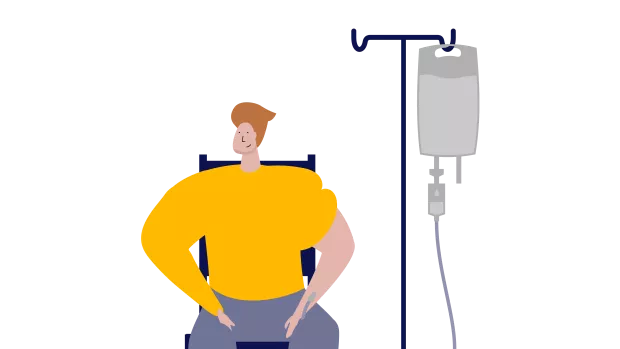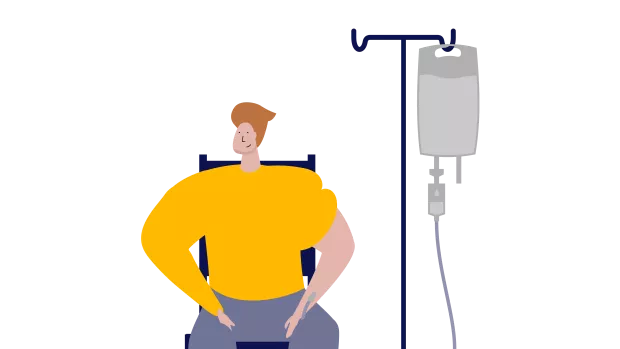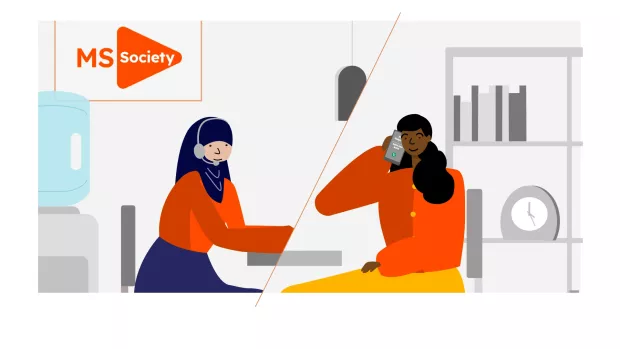
Tips for talking about HSCT
If you’re wondering if HSCT is an MS treatment that’s right for you, these tips can help you and your MS team have a clear and useful discussion. You might find the tips helpful for discussing other MS disease modifying therapies too.
We’ve worked with people with MS and care professionals who’ve had conversations about HSCT. The people with MS told us that when they raise HSCT with a care professional, they want:
- To understand if HSCT is right for them – and if it’s not, why not
- To know about their treatment options
- To learn more about the HSCT procedure and be pointed towards reliable, relevant information
- To feel their doctor or nurse has listened to and heard their wishes around HSCT
- To know what the next steps are, when they’ll happen and why
- Find out about HSCT first
- Talking about HSCT to family and friends
- Which care professional should I speak to about HSCT?
- Make the most of your appointment time
- If you’re told HSCT is not right for you
- If you’re told HSCT could be an option
- If you start the process for HSCT
Find out about HSCT first
It’s good to know some facts about HSCT before you have a proper discussion with a care professional. For example, you can follow the links below to find out about:
- what the research shows about HSCT
- who can get HSCT on the NHS
- what the benefits of HSCT could be
- the possible side-effects and risks of HSCT
- what happens with HSCT treatment
- if there are other treatment options to consider too.
There’s lots to think about. So you might want to make a note of questions and any facts you want to check with your doctor or nurse.
For example, you might think you’re unlikely to meet the NHS criteria but want to make sure. You might want to talk through the pros and cons of HSCT compared to another possible treatment option.
If you're thinking about paying for HSCT
Some people have paid privately for HSCT treatment. If you’re thinking about doing that it’s just as important to discuss things with your NHS MS team, and to learn about the procedure, follow-up care and monitoring.
Read our information about HSCT and other MS disease modifying therapies
Call our MS Helpline to speak to someone about possible treatment options
Hear about a range of people’s HSCT experiences through:
- HSCT blogs on our website
- HSCT blogs on the MS Trust charity website
- Testimonials on the AIMS charity website
Talking about HSCT to family and friends
If you’re considering HSCT, at some point you’ll probably want to – or need to – talk to family or close friends.
You could share information with them, to help them understand HSCT and other treatment options you might have. Even so, you might find yourself explaining things to lots of different people.
Some people say it helps to be clear with friends and family from the start – you appreciate their support, but you might not have all the answers, and you might not always want to talk about it.
You can call our MS Helpline if you ever want to speak to someone outside your family and friends.
Which care professional should I speak to about HSCT?
Once you’ve found out a little about HSCT, you should speak to whichever care professional you feel most comfortable with. But it’ll usually be your neurologist who can advise on HSCT and other disease modifying therapies.
Your GP can also refer to a specialist at an HSCT centre, but they’re unlikely to do this without speaking with your neurologist.
Clinical trial research teams
You might be eligible for an HSCT clinical trial, like the StarMS trial which is for people with ‘active’ relapsing MS. If you are eligible, you might be able to get in touch with the research team directly, as well as through your health care team.
At the appointment
If you don’t usually have an annual appointment with your neurologist and you haven’t seen them for a long time, contact the neurology department and ask for an appointment.
You can have a family member or friend with you when you speak to your doctor or nurse.
Not all neurologists are experts in HSCT. So they might not be able to answer all your questions. They should be happy to suggest where you can find out more.
Other specialists
If HSCT might be offered, the final decisions will be made by a group of health professionals, called a multi-disciplinary team. That team will include your neurologist and a haematologist who specialises in stem cell treatment.
Make the most of your appointment time
HSCT might be just one of several things you want to cover in an appointment. So here are some ways to start the conversation about HSCT and make the most of the time you have.
- Think about why you’re considering HSCT, and make a note of these reasons. For example, you might feel your current DMT isn’t working.
- Let them know you think your MS fits the criteria for HSCT – or you’re not sure after reading about it, but you want to check if it does.
- Ask any specific questions you’ve got. And check how you can raise questions later if they crop up. HSCT is a complicated process and there’s lots to know. Like any treatment decision, you might have questions later on.
Because appointments are so short, you might not get answers to all your questions. But you should be able to find out more and know the next steps.
If you’re told HSCT is not right for you
If you’re told HSCT is not right for you, make sure you understand why. If it’s not clear, you can ask for it to be explained again. It’s particularly useful to know the reasons because:
- They might be things that could change, and you could fit the criteria in future. For example, you might need to try another DMT first. Or maybe your MS isn't thought to be active enough at the moment for HSCT treatment.
- They might be things that won’t change to fit the current criteria. For example, that your MS has progressed beyond the criteria.
Ask what your other options are. They might suggest other DMTs and explain why these could be more suitable for you. If there are no DMTs on offer, you can still ask about the support available to manage your symptoms.
You can ask for a second opinion about treatments. Your neurology team can explain how to do that.
If you’re told HSCT could be an option
If you’re told HSCT could be an option, you don’t have to decide straight away to set things in motion. There’s lots to consider, so you should be given the chance to think about it in your own time.
The doctor or nurse should check you understand what’s involved for HSCT, what results you might expect, risks and side effects. They might not get into all the details, but they should give you information to take away, or show where you can get it from.
To help with that you could ask:
- What else do I need to find out about before I decide?
- Where can I get that information from?
- How can I come back with follow-up questions?
- If I decide to go ahead, when do things happen?
If you start the process for HSCT
If you’ve been referred to an HSCT centre, find out about the timings and when you’ll hear from them. And get contact details so you can get in touch when you need to.
Your usual MS care
Getting HSCT can be a long process. You should still get help with managing your MS before and after the treatment. That includes your overall mental and physical health. You might want to ask about how your usual care will continue. Who should you contact if you notice new symptoms, for example?
HSCT monitoring and aftercare
Ask about HSCT monitoring and aftercare. How will it work and where will it happen? Some aftercare might need to be at a specialist HSCT centre. Some might need to be agreed by healthcare teams locally. And if you’re having HSCT privately, speak with both your private and NHS teams about this.
If you have questions or concerns
You can raise questions or concerns with your care team at any time through the HSCT process. It’s a big treatment decision and you should feel included and understand what’s happening every step of the way.





